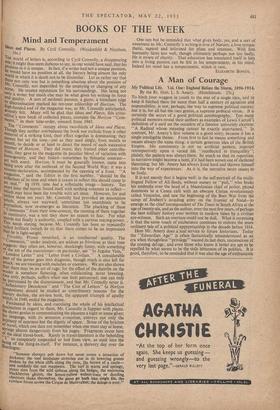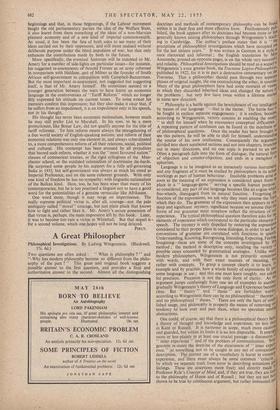A Man of Courage
My Political Life. Vol. One: England-Before the Storm, 1896-1914, By the Rt. Hon. L. S. Amery. (Hutchinson. 25s.) To hitch your waggon in youth to the star of a single idea, and to keep it hitched there for more than half a century of agitation and responsibility, is not, perhaps, the way to supreme political success; .but it is, for all but the rare genius, a supreme political virtue. It is certainly the secret of a good political autobiography. Too many political memoirs reveal their authors as examples of Lewis'Carroll's definition of a surd on the occasion of a famous university election: "A Radical whose meaning cannot be exactly ascertained." In contrast, Mr. Amery's first volume is a good story, because it has a single intelligible theme. From first to last he means something and means always the same thing: a certain generous idea of the British Empire. His consistency is not an artificial pattern, imposed retrospectively upon a varied life "recollected in tranquillity"; plainly, the pattern was always there. So much so that its repetition in narrative might become a bore, if it had been woven out of sheltered theorising; but Mr. Amery has always lived hard and thrown himself into the way of experiences. As it is, the narrative never ceases to be lively. It is not merely that it begins well: in the self-portrait of the multi- lingual Fellow of All .Souls, without money or "pull," who broke his umbrella over the head of a Macedonian chief of police, played dominoes in a Canea café with an obscure Cretan revolutionary called Venizelos, and saw the beginning of the Boer War from the camp of Joubert's invading army on the frontier of Natal—to emerge as the chief correspondent of The Times in' South Africa at the age of twenty-six, and as the author, over the next few years, ofperhaps the best military history ever written in modern times by a civilian eye-witness. Such an overture could not be dull. What is surprising is that the same touch of exuberance continues to enliven the more ordinary tale of a political apprenticeship in the decade before 1914.
Here Mr. Amery does a 'real service to future historians. Today the "Edwardian Age" is often fantastically misunderstood as an era when thoughtless "privilege" wasted its last days, unconscious of the coming deluge ; and even those who know it better are apt to be repelled by what seems to be the stale bitterness of its politics. It is good, therefore, to be reminded that it was also the age of enthusiastic
beginnings and that, in those beginnings, if the Labour movement taught the old parliamentary parties the idea of the Welfare State, it also learnt from them something of the ideas of a non-Marxian planned economy and of a new kind of imperial commonwealth. As usual, it has been the fate of both sides to see many of their ideas carried out by their opponents, and still more realised without deliberate purpose under the blind impulsion of war; but that only enhances the contribution made by both to the future.
More specifically, the eventual historian will be indebted to Mr. Amery for a number of side-lights on particular issues—for instance, his suggested re-assessments of Arnold Forster as an army reformer in comparison with Haldane, and of Milner as the founder of South African self-government in comparison with Campbell-Bannerman. But the most important re-assessment, not suggested but suggesting itself, is that of Mr. Amery himself. He sometimes seemed to a younger generation between the wars to have learnt an economic language in the controversies of "Tariff Reform" which no longer fitly expressed his attitude on current issues. To some extent his memoirs confirm this impression; but they also make it clear that, if he suffers from an impediment, it is an impediment only in his speech, not in his thought.
His thought has never been economic nationalism, however much he may still prefer List to Marshall. In his eyes, to be a mere protectionist, like Bonar Law, did not qualify anyone for the title of tariff reformer. To him reform meant always the strengthening of a free world society of English-speaking nations; and reform of their economic relations was only one element in, and always subordinated to, a more comprehensive reform of all their relations, social, political and cultural. His contempt has been aroused by all prejudices that barred such reform, whether it was the "most favoured nation" clauses of commerical treaties, or the rigid syllogisms of the Man- chester school, or the outdated colonialism of doctrinaire die-hards. He surprised some people by his support for a fully self-governing India in 1935, but self-government was always as much his creed as Imperial Preference, and on the same coherent grounds. With only one kind of freedom he has no sympathy: with linguistic nationalism of the Balkan kind. Here, too, he has been wiser than many of his contemporaries, but he is too practised a linguist not to have a good word for the potentialities of a genuine vernacular like Afrikaans.
One word more, though it may verge on impertinence. The really supreme political virtue is, after all, courage—not the pale ambiguity called "moral" courage, but just plain pluck that knows how to fight and rather likes it. Mr. Amery's secure possession of that virtue is, perhaps, the main impression left by this book. Later, it was to become too rare a virtue in Whitehall. But that sequel is . for a second volume, which one hopes will not be long delayed.
PERCY.



































 Previous page
Previous page